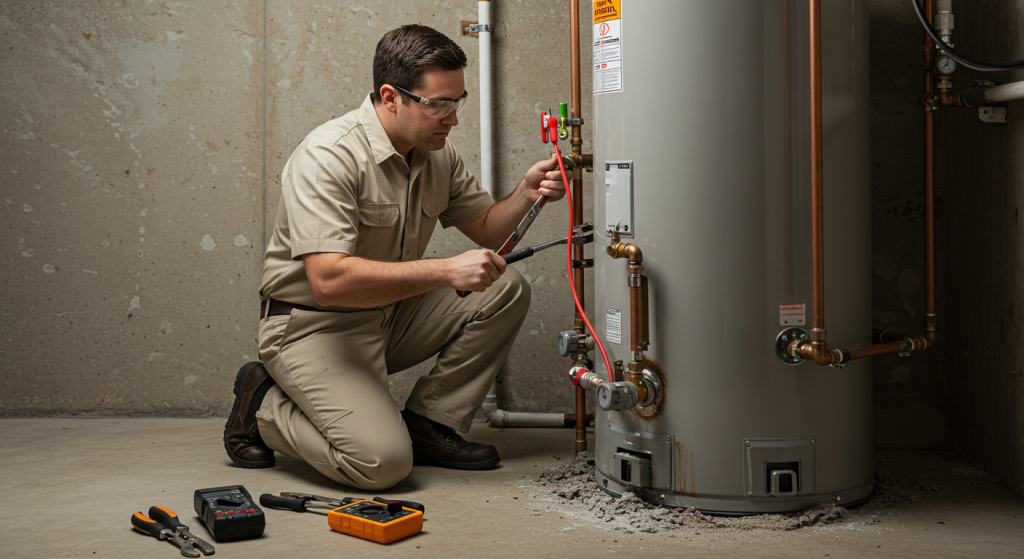
Imagine stepping into the shower on a chilly Bainbridge Island morning, only to be greeted by ice-cold water. If your water heater is struggling to keep up, it might be time to consider a replacement. Addressing these issues early can prevent costly breakdowns and ensure a steady supply of hot water for your home.
Inconsistent or No Hot Water
If your water heater frequently runs out of hot water or takes too long to heat up, it may indicate a failing heating element or thermostat.
Sediment buildup can also reduce heating efficiency, leading to inconsistent temperatures. If flushing the tank doesn’t resolve the issue, a professional assessment may be needed.
Strange Noises Coming from the Tank
Popping, banging, or rumbling noises often result from sediment accumulation at the bottom of the tank.
Over time, this sediment hardens, forcing the heater to work harder and potentially overheat. Ignoring these sounds can lead to damage or system failure.
Discolored or Rusty Water
Rusty or murky water from your hot tap may indicate corrosion inside the water heater tank.
If left unaddressed, this corrosion can weaken the tank, leading to leaks and compromised water quality. If the issue persists, replacing the unit may be the best solution.
Water Leaks Around the Heater
Any moisture or pooling water around your heater is a red flag.
Leaks can stem from fractures in the tank due to metal expansions and contractions over time. Even small leaks should be addressed promptly to prevent significant water damage in your home.
Reduced Water Pressure
Sediment buildup not only affects water temperature but can also clog pipes, reducing water pressure.
This can make daily activities like showering and washing dishes frustrating. Regular maintenance, including flushing the system, can help, but if pressure issues persist, an expert should assess the system.
Foul-Smelling Water
A rotten egg odor from your hot water may indicate bacterial growth inside the tank, especially if the water heater is set at a low temperature.
This can impact water quality and pose potential health risks. Adjusting the temperature or replacing the anode rod may help, but persistent odors should be evaluated by a professional.
The Age of Your Water Heater
Traditional tank water heaters typically last 8 to 12 years.
If your unit falls within or beyond this range, it may be time for an upgrade. Tankless water heaters can last up to 20 years with proper maintenance.
Rising Energy Bills
An aging or inefficient water heater has to work harder to provide hot water, leading to increased energy consumption.
If you’ve noticed a spike in your utility bills without a corresponding increase in water usage, your heater could be the culprit. Upgrading to a newer, energy-efficient model can lower costs in the long run.
Frequent Need for Repairs
If your water heater requires constant repairs, it may be more cost-effective to replace it.
Repeated issues often signal that the unit is nearing the end of its lifespan. Investing in a new water heater can save you money on repairs and improve performance.
Visible Signs of Corrosion
External rust or corrosion on the tank or its components is a clear sign of deterioration.
This can lead to leaks or complete system failure if not addressed in time. If rust is visible, consult a professional to determine whether repair or replacement is necessary.
What to Do If You Notice These Signs
If you’ve observed any of the above indicators, it’s time to take action:
- Inspect the Unit – Look for visible signs of damage, leaks, or rust.
- Flush the Tank – Regular flushing can remove sediment buildup and improve efficiency.
- Check the Anode Rod – This component prevents tank corrosion; replacing a worn-out anode rod can extend the heater’s lifespan.
- Consult a Professional – If issues persist, an expert can determine whether a repair or replacement is the best option.
How Regular Maintenance Can Extend Your Water Heater’s Life
Routine maintenance can maximize the lifespan of your water heater and prevent unexpected failures.
- Annual Inspections – A professional check-up can catch minor issues before they become major problems.
- Temperature Settings – Keeping the thermostat at 120°F helps prevent overheating and reduces energy consumption.
- Seismic Bracing – In earthquake-prone areas like Bainbridge Island, securing your water heater with seismic straps can prevent it from toppling during tremors.
FAQs About Water Heater Replacement
How long does a water heater typically last?
Traditional water heaters last 8 to 12 years, while tankless models can last 20 years with proper care.
Should I repair or replace my water heater?
If your unit is over 10 years old, requires frequent repairs, or causes high energy bills, replacement is often the best long-term solution.
What size water heater do I need?
It depends on your household size and hot water usage. A professional plumber can help determine the right capacity for your needs.
How much does water heater replacement cost in Bainbridge Island, WA?
Costs vary based on the type and size of the unit. Swift Plumbing & Heating provides upfront pricing and expert installation services.
Can I install a water heater myself?
While DIY installation is possible, it’s highly recommended to hire a licensed professional to ensure proper setup, safety, and compliance with local codes.
Conclusion
Recognizing the signs of a failing water heater can help you avoid cold showers and costly emergencies. If your unit is showing signs of wear, consider reaching out to a professional for a thorough inspection.
Swift Plumbing & Heating offers expert water heater replacement services in Bainbridge Island, WA, ensuring your home stays comfortable year-round.

